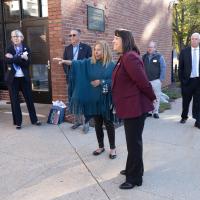
Westfield State University Celebrates 20 Years of Excellence with Master of Public Administration Program

Campus globe.
In a journey spanning nearly two decades, Westfield State University's Master of Public Administration (MPA) program has evolved into a beacon of excellence in public service education. In 2001, Dr. Catherine Lilly, then Dean of the College of Graduate and Continuing Education, convened representatives from several academic departments to explore the idea of creating a multi-disciplinary, and affordable, MPA program at the college.
Dr. Philip Zampini of the Department of Political Science drafted a proposal for a 39-credit MPA program two years later, which won approval from the Massachusetts Board of Higher Education. In 2004, its first graduate students were admitted that September, with Dr. Zampini becoming the inaugural MPA program director. He continued in that role for the first ten years of the program, spurred on with help from Dr. Lilly’s sustained interest and leadership in the formative years of the program.
The collaborative effort of faculty and staff from various departments, including criminal justice, economics and management, geography and regional planning, and political science, laid the foundation for the MPA's success. The program was built to offer a wide range of classes which centered on core public administration courses alongside specialization in criminal justice administration, community planning, and non-profit management.
Inspired by his colleagues, Dr. Zampini drew on the University’s excellent full-time faculty and adjunct faculty with specific areas of expertise, attracting a diverse array of students eager to apply their career experience to public service roles. In 2014 Dr. David Smailes, former Professor of Political Science, became program director for four more years, continuing the program's mission until 2018, when Dr. Charles DiStefano took up the mantel.
Dr. Charles DiStefano, Assistant Professor of Political Science, still serves as the chair of the program. Dr. DiStefano’s strong academic background in the field of public administration in addition to his rich real-world experience, “has a very positive impact on the program,” Dr. Zampini remarked.
Reflecting on the program's growth, Dr. DiStefano acknowledged the mentorship of Dr. Zampini and the program's commitment to cultivating future leaders in public administration, commenting that the program would be “in good hands” under Dr. DiStefano’s tutelage. “I have to thank Phil for being a mentor to me and helping me to take over, because it’s rare for a brand new professor to take over a chair-ship,” Dr. DiStefano said.
Public administration is a diverse field by nature, offering degrees which can be applied in areas of study such as public management, public healthcare, nonprofits, and civic engagement positions, among others. Dr. Zampini, now retired, emphasized the versatility of public administration, and encouraged those who are interested in public service to pursue careers which interests them.
“Government needs to run efficiently, and if it’s going to sustain any kind of confidence in the citizenry, we need experts in different fields,” Dr. Zampini said. “MPA programs are devoted to producing people with skills and knowledge in how to manage government programs and how to deliver services to people, and I think it’s a noble profession to go into the public sector and try to win the confidence of the people.”
“I try to work with the students on their motivation for public service,” Dr. DiStefano added. “They want to be able to do something where they can see the good they’re doing, whether it’s government nonprofit or otherwise. We have a strong MPA program so that we can train these future leaders. We even have a rising number of international students, so we’re making our mark on the field and want to keep them involved in the process as much as possible, to provide those services we need for functioning democracy.”
As an integral component of the program, students engage in collaborative projects that exemplify civic engagement. For example, working as consultants with a diverse array of organizations allows them to apply real-world experience to classroom discussions and problem-solving. The established partnerships with local businesses also create valuable networks connecting current students, alumni, and faculty members, facilitating opportunities for those interested in specific fields.
To honor student efforts and learning, final capstone projects are undertaken to celebrate the culmination of their studies. Instead of arranging for students to defend their capstone projects, as is widely practiced, Westfield State allows for students to present them in bi-annual, public ceremonies that take place in the spring and fall. Events such as these help to further foster a community of diverse backgrounds united in the pursuit of effective governance and public service excellence.
As the Master of Public Administration program at Westfield State University continues to thrive, it stands as a testament to the dedication of its founders, faculty, and students. With a legacy of excellence in public service education, the program remains committed to nurturing future leaders who will drive positive change and uphold the values of effective governance and civic engagement.
“Public administration is such a highly interdisciplinary program,” Dr. DiStefano said. “Regardless of your background, there is a role for you.”


